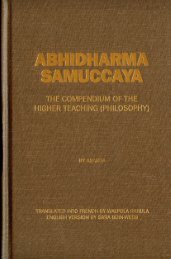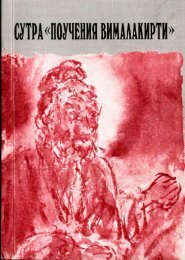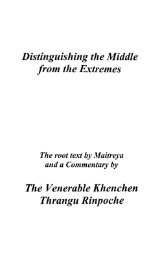Abhidharmakosabhasyam, Volume IV
Abhidharmakosabhasyam, Volume IV
Abhidharmakosabhasyam, Volume IV
You also want an ePaper? Increase the reach of your titles
YUMPU automatically turns print PDFs into web optimized ePapers that Google loves.
Footnotes \Ы1<br />
the dharmalaksanas." But Stcherbatski states that the definition of these masters is that of<br />
Pdnini, i.4, 54: svatantrah kartd.<br />
We see, Kofa, iii.27 (p. 413), that the Grammarians, or Vaiyakaranas, protest against<br />
the thesis of "action without an agent" (akartrkd kriyd). In the same passage, certain<br />
masters (kecid vddinah) maintain that Pratityasamutpada supposes a support, namely an<br />
atman.<br />
151. Vydkhyd: tasya tu svdtantryam ndstiti darsayann aha trividham cedarh karmeti vistarah<br />
/ kdyasya cittaparat antra vrttih cittapravartitvdt kdyakarmanah / cittasydpi kdye vrttih<br />
svakdranaparatantrd manodharmamanaskdrddiparatantrd / tasydpy evam / tasya<br />
cittasvakdranasya svakdranaparatantrd vrttir Hi ndsti kasya cid api svdtantryam kdyasya<br />
cittasya cittakdranasydnyasya vd / pratyayaparatantrd hi sarve bhdvdh<br />
caturbhis cittacaittd hi samdpattidvayam tribhih<br />
dvdbhydm anye tu jay ante iti vacandt (ii.65) /<br />
dtmano'pi ca nirapeksasya buddhivisesddyutpattdv akdranatvdbhyupagamdn na<br />
svdtantryam sidhyati / tasmdn naivamlaksana iti svatantrah karteti.<br />
152. Vydkhyd: tasydkdranatvam upadarsayann aha / ... purvam smartavydrthe smrtir<br />
utpadyate / smrtei chandah kartukdmatd / chanddd vitarkah cetandvis'eso'bhisamskdralaksanafp<br />
prajndviseso'bhisamskdralaksanah prajnaviseso vdyogdcdranayena vaibhdsikanayena<br />
tv abhinirupandvikalpalaksanah (The MS is perhaps incorrect. Here Hsuan-tsang translates<br />
vitarka with the two characters which, elsewhere give vitarka-vicdra. For the Vaibhasikas,<br />
vitarka signifies here {abhi)nirupana vikalpa, one of the three vikalpas defined in Kosa,<br />
i.33a; one type of prajn~d {prajfidvis'esa) which consists of examining, or deliberation. For<br />
the Yogacarins, vitarka signifies prajudviiesa abhisamskdralaksana: one prajnd which has<br />
the characteristic of action or decision. For the author, vitarka is a cetand, "volition," the<br />
characteristic of which is "to create" (abhisamskar) (Kos'a, i.l5a) / vitarkdt prayatno viryam<br />
/ prayatndd vdyuh / tato vdyoh karma de/dntarotpattilaksanam iti kim atrdtmd kurute.<br />
153. Vydkhyd: vijHdne pratisedhdd iti yaivopalabdhis tad eva vijndnam / vijndne cdtmanah<br />
sdmarthyam pratisiddham cittdd evdstu samskdravifesapeksan na hi... phutsvdhdndm iti /<br />
yathdtathoktam iti/ tadvikdravikdritvdddirayas caksurddaya iti (i.45a-b) /yathdkah<br />
kasydfrayah . .. naiva sa evam air ay ah (note 145).<br />
154. According to the formula: na hi bhiksavah karmdni krtdny upacitdni bdhye<br />
prthividhdtau vipacyante / apitupdttesu skandhadhdtvdyatanesu.. .(Divya, 54 and passim).<br />
On sattvdkhya, updtta, see Kosa, i,10b, English trans, (p. 65), 34c (p. 98), 39 (p. 107), iv.5d<br />
(P- 569).<br />
155. H. Ui, Vaisesika Philosophy, 75, 98; Kosa, iv.2b (p. 555).<br />
156. Above, p. 1347.<br />
157. For the Sarvastivadins, the cause of retribution "gives forth" its fruit when it is past<br />
(ii.57, 59); as a consequence, the past exists (v.25a-b, p. 807). Vasubandhu remarked (v. p.<br />
818) that the Sautrantikas do not admit that the result arises directly from action. For the<br />
different results of action, see iv.85.<br />
See Madhyamaka, xvii. 6 and following, "If an action lasts until its retribution, it would<br />
be eternal..." The doctrine that Vasubandhu presents here is refuted xvii. 12; the opinion<br />
of Candrakirti, xvii.13: When an action arises, there also arises in the series a dharma<br />
unassociated with the mind, morally neutral, destroyed through bhdvand, that is called<br />
aviprandia, which produces the result of the action.<br />
From another point of view, the ankura cannot arise from either the destroyed bija, or<br />
from a non-destroyed bija; Catustava, quoted in Madhyamakdvatdra, 97, Bodhicarydvatdraparljikd,<br />
ix.108.<br />
158. For karmasamtdnaparindmavi/esa, see ii.36c (p. 211).


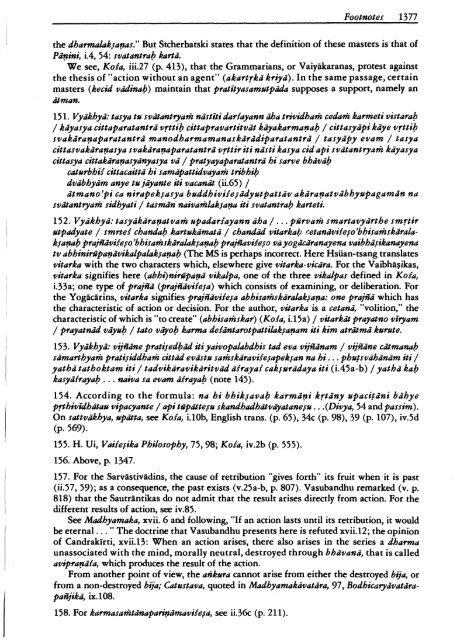
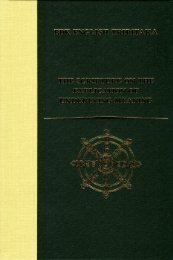
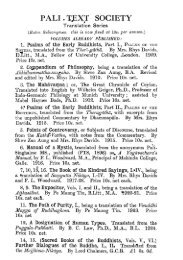
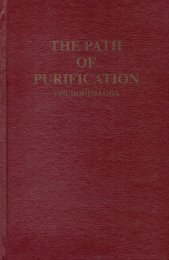
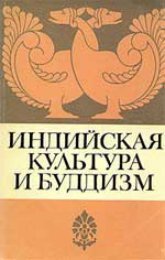
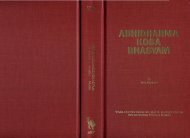

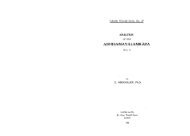

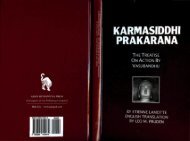
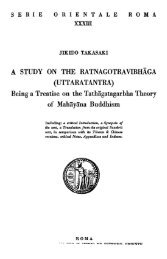
![Long Discourses of the Buddha [Digha Nikaya]](https://img.yumpu.com/32792419/1/164x260/long-discourses-of-the-buddha-digha-nikaya.jpg?quality=85)
